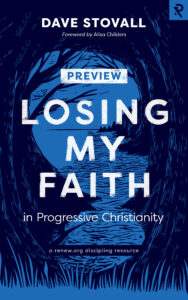Have you heard the phrase or maybe even said it yourself: “I’m spiritual but not religious”? It’s a description that has become so widely used in America and the West that researchers have even given it an acronym: SBNR. In short, when someone says they are spiritual but not religious, they typically mean they have a general belief in God but reject any formal organization, especially anything that would impose personal requirements on them. Okay, I’ve probably simplified that too much for some people.
I know that sometimes people embrace SBNR out of pain because someone wounded them in a local church or even in their own family. However, quite often, the decision to abandon the gathered community has more to do with a desire to call one’s own shots than anything else. When you think about it, merely being spiritual can be convenient because you can pick and choose which Bible verse you like, organize your life around disciplines and schedules that match your desire, and jump on whichever social or political bandwagon that eases your conscience.
In addition, merely being spiritual but not religious means also that you can reject anything and everything that might make you feel uncomfortable or convicted. Being spiritual but not religious fits nicely into our world of independence, especially when you want to be free from any form of God that might nudge you off your personal throne. SBNR sounds wise to our enlightened ears today. Yet, if there really is a God, then merely being spiritual might also be very deadly.
Spiritual-But-Not-Religious Balaam
A colossal illustration of this reality is found in the life of a man named Balaam, who lived around 1400 B.C., and whose path intersected with the nation of Israel in the book of Numbers, chapters 22-24. The biblical and extrabiblical history portrays Balaam as somewhat of a Spiritual Rock Star in his day. Balaam was a renowned spiritual expert whom people would hire to curse and bless others, as well as tell fortunes for a fee. Balaam also seemed to have some knowledge of the God of the Old Testament. But the problem with Balaam, as my wife put it, was the motive of his heart. Balaam wasn’t really interested in discovering and following the one true God in complete obedience, but rather in working out a spiritual reality that fit his own makings.
In the historical narrative, Balaam is summoned by Balak, the king of Moab, who offers him a substantial payment to come and curse Israel, as he feared them. The messengers of Balak arrived and presented Balaam with an offer, a contract, and some cash. Balaam replied that he needed to sleep on it and that he’d give them word in the morning. “Let me pray about it!” That sort of thing.
“Balaam wasn’t really interested in discovering and following the one true God in complete obedience, but rather in working out a spiritual reality that fit his own makings.”
Balaam did hear from the Lord that night, and the answer was a firm, “No!” It should have been cut and dry, and with God, sometimes that’s exactly how it is. Initially, Balaam told them he was not going to accept the king’s offer, and that was it, until the king sent more men with higher dignity and more zeros at the end of the paycheck number. From here, Balaam began a cycle of compromise that eventually led to his death. Compromises are a good thing in politics and indeed essential when trying to work out a marriage relationship. Compromise is anything but a good thing when God has given you a clear directive.
So, Balaam heads off to at least give Balak a hearing when the account of the talking donkey enters the narrative. Have you heard that one? If you grew up in church, you probably have. As chapter 22 progresses, Balaam is riding his donkey to meet the king when an angel stands in the path with the intent to kill the seer. But right before the angelic soldier of God strikes Balaam down, God allows the donkey to speak to Balaam, and his life is saved.
Some people have a problem with the text describing a donkey that spoke, but I don’t. God can do anything. Though I sometimes wonder if the donkey talked in a West Texas drawl. The proper question surrounding this, or any miracle, is really one of purpose. For what reason did God move the laws of nature in this way? Why divinely alter a donkey’s DNA and cause the dumb animal to warn Balaam of impending doom?
“Compromise is anything but a good thing when God has given you a clear directive.”
I believe it comes down to this reality: God has a way of choosing the foolish things to shame the wise (1 Corinthians 1:27-28). What could be more arresting to Balaam’s false wisdom than being humiliated by one of the most ignorant creatures, a donkey?
At this point, Balaam realizes his profound transgression and offers up elegant words of contrition. But was it deep heart repentance, or was he merely afraid because he got caught? True repentance would have caused him to return home. But he doesn’t do that. He continues to negotiate, in a sense, with God, and engages in dialogue with Balak and his advisors. Through this process, Balaam does not curse Israel; instead, he pronounces blessings on God’s people and prophetic messages about the future of God’s plans to redeem the whole world through Christ, who would come from Israel. The greatest of these blessings and prophesies states, “I see him, but not now; I behold him, but not near: a star shall come out of Jacob, and a scepter shall rise out of Israel; it shall crush the forehead of Moab and break down all the sons of Sheth” (Numbers 24:17, ESV).
Wow! Could anything be more obvious regarding God’s intentions and how Balaam should have responded (not to mention the whole donkey thing)? God’s plan is clear. Not only would the ruling Messiah come from Israel, but God would also destroy Moab. So why in the world would anyone want to curse Israel and support Moab? Because Balaam’s pursuit of gain over God deluded his thinking. He was indeed spiritual, but not religious enough to bow to his Maker. Thus, his spirituality was in truth merely a product of his own making, serving his own interests and glory.
Where Balaam’s Path Leads
In the New Testament, Peter notes those who have “left the straight way and wandered off to follow the way of Balaam son of Bezer, who loved the wages of wickedness” (2 Peter 2:15, NIV). Jude, the biological brother of Jesus through Joseph and Mary, includes Balaam in a list of those who rebelled against God for gain, and the apostle John also recognizes Balaam’s rebellion in Revelation 2:14 (for context, see Numbers 31:15-16) where the seer not only attempted to curse Israel, but offered Balak advice on how to corrupt the nation.
If you follow Balaam’s path to the end, we see in Numbers 31:8 that he was ultimately killed along with Balak and five other kings who rebelled against God. In Balaam’s great spirituality, he not only lost his life, but his soul. History teaches us that Balaam was not alone in his blunder toward bounty over God. We see Achan in Joshua, the Rich Young Ruler, and dramatically, Ananias and his wife, Sapphira, who were struck down because they lied about financial gain to the church and God. All these people had a level of spirituality. None of them was an atheist. The problem was that they set themselves up above God and paid the consequences.
“In Balaam’s great spirituality, he not only lost his life, but his soul.”
Who Is on the Throne?
So, while SBNR may seem like a modern, enlightened catchphrase, it’s actually nothing new. The question posed to Balaam so many years ago remains the same question today. Will we humbly submit to God, or will we stay on the throne? While we are some 3,500 years removed from Balaam’s history, the heart of the question remains the same for us today as we navigate our present place on the world historical calendar.
The answer is not one of asceticism, as a poor person can reject God just as much as a rich person. The problem is not in the material world itself, and even James notes that “Every good and perfect gift is from above, coming down from the Father of the heavenly lights, who does not change like shifting shadows” (James 1:17, NIV).
The answer, in short, is surrender. In complete surrender, we acknowledge the magnitude of God and fully accept the reality that we cannot outplay Him, argue with Him, or conceal our hearts from Him. In surrender, we realize that we cannot force God into some compromise, like world politicians securing their preferred results. Surrender comes when we submit to God and His Word, rather than devising a system that forces God’s Word to fit into our preferred worldview.
“Surrender comes when we submit to God and His Word, rather than devising a system that forces God’s Word to fit into our preferred worldview.”
But here’s the towering paradox about surrendering to God; out of our complete abdication, we gain more than we can possibly imagine (Ephesians 3:20). When we step down from the throne and trust and obey God, our spiritual eyes are opened to the reality that the things of this realm are passing away and that God has something better in mind for those who will follow Him. On one hand, Jesus made it very clear that we can gain all that this world has to offer and yet lose our eternal soul. On the other hand, when we choose to follow God in complete obedience, even when we don’t understand everything, He has reserved more for His children than this world can ever offer. In thinking back to the Rich Young Ruler who chose his loot over the Lord, Jesus assured Peter, who had left everything, that “everyone who has left houses or brothers or sisters or father or mother or wife or children or fields for my sake will receive a hundred times as much and will inherit eternal life” (Matthew 19:29, NIV).
No, it doesn’t always make sense. The world says to take control of your own destiny, even when it comes to God. The power is in the exact opposite. It is in fully surrendering to God, taking Him at His word, and walking in trusting obedience that we find peace for our souls, purpose for life, and assurance for the future.
Your Final Chapter
For Balaam, it was a choice. By choosing God, he might have lost his financial stability and even his reputation as a heavyweight spiritual guru. However, he would have obtained a different final chapter of his life, one that included being with God and his children, rather than being estranged from God and peace for eternity. Balaam chose what was quick and financially rewarding, but lost everything. Okay, that was Balaam. What about you?
What is God saying to your heart today that you are possibly wrestling with? Will choosing to follow God cost you? It indeed might, and I guarantee that it will sometimes. But we also know that for Jesus, going to the cross cost him everything so that we might have peace with God and a purpose for our lives and eternity.
For me, I don’t always get it right. But I know God’s love for me and am willing to trust Him for the future. True spirituality is not about me and my religious formulations. Instead, it is about trusting and obeying God even when I don’t understand everything. That is where true hope is found, and I’d love to have you along the journey with me.
“The modern materialists are not permitted to doubt; they are forbidden to believe.” ― G.K. Chesterton











